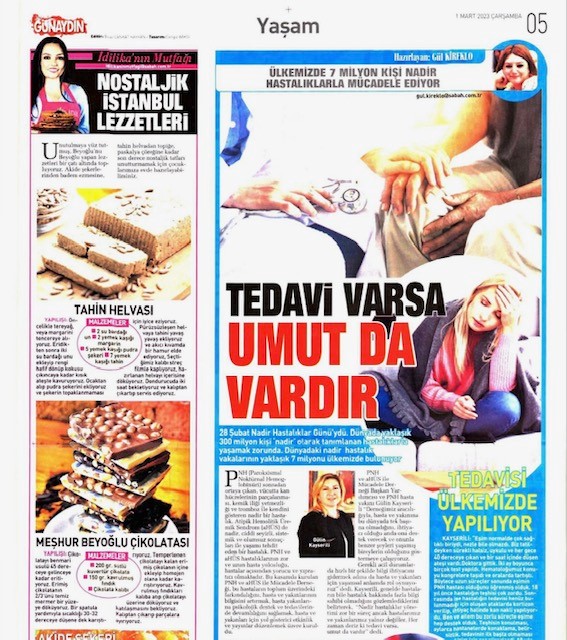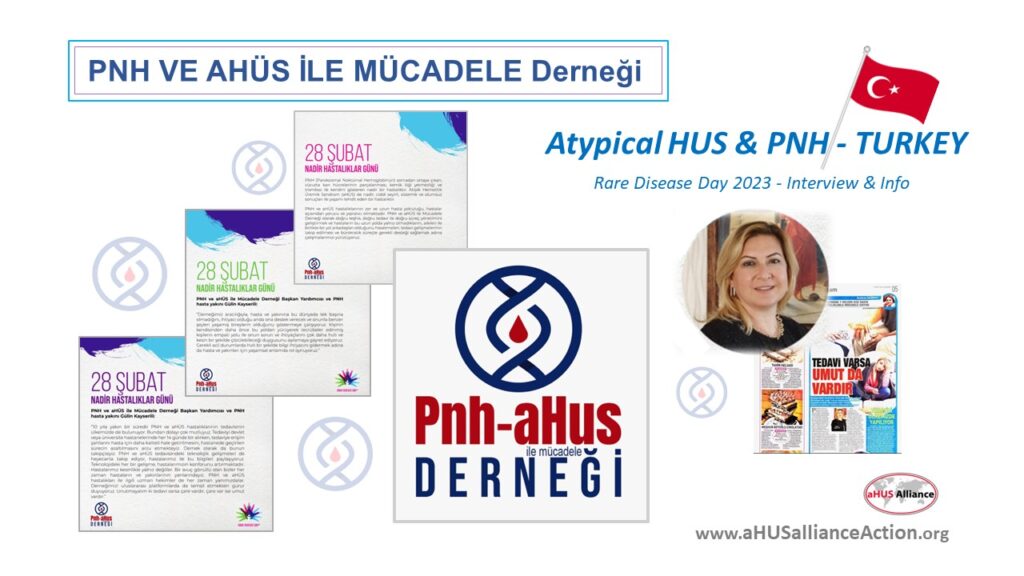
We’re pleased to feature the outstanding work of the Turkish PNH & aHUS advocacy group
PNH VE AHÜS İLE MÜCADELE Derneği.
Along with resources and materials in Turkish from their website and social media campaign for Rare Disease Day 2023, scroll further down to view the English language version of an interview with Gülin Kayseri̇li, board member of the Turkish Association of the Fight Against PNH and aHUS Diseases, and also is a valued member of the global atypical HUS Community Advisory Board.
Vizyonumuz: PNH VE AHÜS İLE MÜCADELE Derneği
- PNH ve aHÜS hastalıklarının toplum üzerindeki farkındalığını artırmak
- PNH ve aHÜS Hakkında hasta ve yakınlarının bilgisini artırmak
- Hastalarda oluşabilecek yan hastalıklarla ilgili bilgilendirme çalışmaları yapmak
- Hasta yakınlarına psikolojik destek sağlamak
- Hastaların tedavilerinde devamlılığı sağlamak
- Daha fazla doktorun PNH ve aHÜS konularında faaliyet göstermelerini sağlamak
- Hasta ve yakınları için yol gösterici etkinlik ve yayınlar düzenlemek
Derneğin Adı: “PNH VE AHÜS İLE MÜCADELE Derneği” dir. Derneğin merkezi İstanbul’dur.
E: info@pnhveahuslemucadeledernegi.org
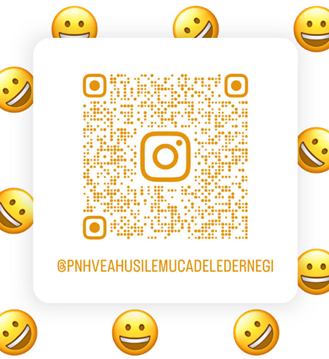
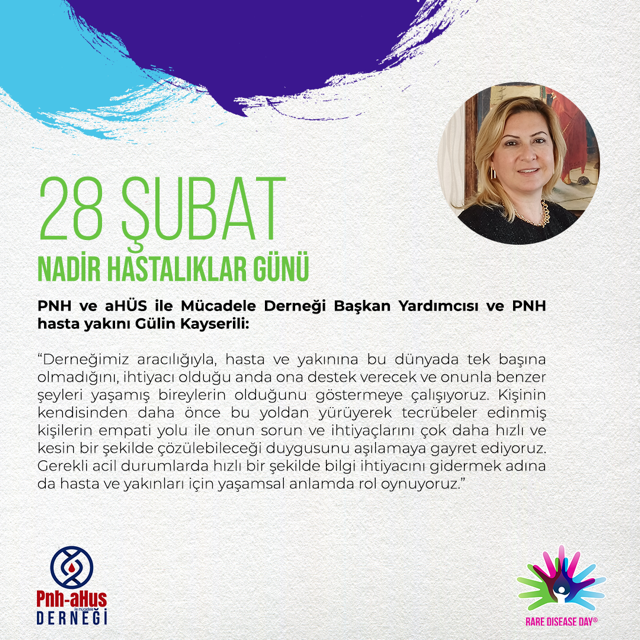
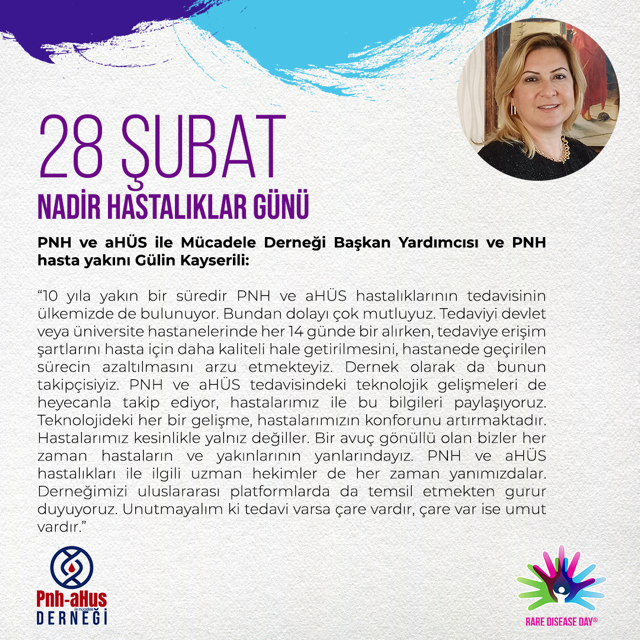
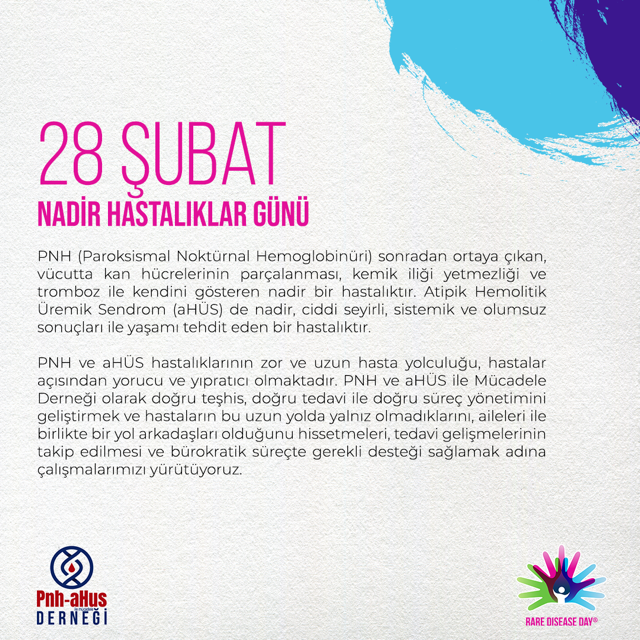
28 Şubat 2023: Söyleşi
Röportajı Türkçe okumak için tıklayın
A Rare Disease Day Interview with Gülin Kayseri̇li
Lead for Int’l Relations with the Turkish Association of the Fight Against PNH and aHUS Diseases
& member of the aHUS Community Advisory Board
(English Translation of the Rare Disease Day interview)
1. Could you briefly talk about the establishment story of your association?
The difficult and long patient journey of PNH and aHUS diseases is tiring and exhausting for
patients. Our association was established in order to develop the right process management
with the right diagnosis, the right treatment, and to make the patients feel that they are not
alone on this long journey, that they are a companion with their families, that they follow the
drug developments and provide the necessary support in the bureaucratic process.
2. What kind of activities do you carry out, can we learn about your projects and
studies?
We can briefly describe the activities and works we carry out, such as raising awareness of
PNH and aHUS diseases on the society, increasing the knowledge of patients and their
relatives, ensuring the continuity of psychological support and treatment for patients and relatives.
3.What is PNH and aHUS?
PNH (Paroxysmal Nocturnal Hemoglobinuria) is a clonal stem cell disease characterized by
acquired, non-immune intravascular hemolysis findings, bone marrow failure and thrombosis.
Since PNH occurs as a result of somatic mutation of the hematopoietic stem cell, it affects all
three cell lines of the hematopoietic system at different rates. PNH is an ultra rare disease.
Its true incidence is unknown, due to its rarity and clinical features that can be easily
overlooked. Our activities include organizing guiding events and publications for patients and their
relatives.
aHUS (Atypical Hemolytic Uremic Syndrome) is a rare, serious, systemic and life-
threatening disease with adverse consequences. aHUS affects both children and adults and
is associated with thrombotic microangiopathy (TMA). TMA is the formation of blood clots in
small blood vessels throughout the body, which can cause widespread multi-organ failure
problems. aHUS is mainly caused by chronic, uncontrolled activation of the body’s immune
system, the complement system, which fights infections and functions as an endogenous
scavenging machine for dead cells. Normally, the complement system is highly self-regulated
by certain proteins that control its destructive effects, but in aHUS this regulation is largely
disrupted by mutations in complement regulatory proteins. Disturbances in this control
mechanism can lead to overactivation of the complement system, which then causes
damage to the body’s own tissues. Prompt diagnosis of the disease and early initiation of
appropriate treatment improves outcomes and possibly reduces the risks associated with
TMA and subsequent life-threatening complications such as kidney failure, stroke or heart
Attack.
4. How does being a patient association contribute to the patient and their relatives?
First of all, it shows the patient and their relatives that they are not alone in this world, that
there are individuals who will support them when they need it and have experienced similar
things. It provides the feeling that the problems and needs of those who have had experience
walking this way before him can be solved much faster and more precisely through empathy.
In case of emergency, the need for information is urgently needed.
Providing different resources through the association is of vital importance for patients and
their relatives.
5. What are the basic needs of PNH and aHUS patients and what are the needs in the
management of the disease?
Both diseases are within the scope of very rare diseases which are very difficult to diagnose.
First of all, the specialist physician should be able to predict this disease, and for this, they
should have theoretical and practical experience in the disease. In this context, it is
necessary to increase the awareness of the disease among specialist doctors. In the process
after the diagnosis is made, it is necessary to clearly explain the development of the disease
and the stages that can be experienced during the process to the patients and their relatives,
while informing the patients by the doctors. The patient and his/her relatives should not find
themselves drifting into obscurity.
There are different difficulties in accessing drugs used for treatment. The approval of the use
of the drug, and the solution of the problems encountered during the ongoing treatment
process, serves to make matters difficult for the patients. The reflection of newly developing treatment technologies on daily life is more severe than expected.
6. Illness can lead to feelings of social isolation. However, what duties do other
members of the society have to make them feel that they are a part of the society?
The majör problems are ignorance and incomprehension. In general, it is observed that even
patients do not know much about the disease they have. There are shortcomings here,
usually due to the fact that the treating doctor does not have much time to explain or does
not need to convey on this subject. We are trying to solve this through our association’s
forum site and WhatsApp groups.
7. What are your suggestions to the relatives of patients who have just met with the
same disease?
We had many difficulties in the previous years regarding diagnosis, treatment and correct
process management. Currently, our association supports our patients in the management of
the entire process related to PNH and aHUS diseases. We closely follow technological
developments related to pharmaceuticals. We carry out the whole process as a patient
support group with our forum and WhatsApp groups. We have books that explain the disease
in a simple way for our infant, child and adolescent patients.
8.What would you like to say about Rare Diseases Awareness Day?
Rare diseases are difficult to manage. Our patients are definitely not alone. We, a handful of
volunteers, are always with them. We support Rare Disease Awareness Day.
Specialist physicians related to PNH and aHUS have always stood by us as an association
and did not spare their help. Thank you everyone. We also represent our association on
international platforms. Let’s not forget that if there is medicine, there is a cure, if there is a
cure, there is hope.
9. What are the messages you want to give to all stakeholders in the common
struggle?
As one of the groups that make up grassroots of advocacy in these diseases, we strive for a cooperation between the health system of our country and the companies that develop technology in a way that will benefit all stakeholders. These groups are mutually important to each other, making the others unimportant in the absence of one another. Unconditional cooperation will provide maximum benefit for all groups.
Istanbul, Turkey is headquarters for The Association for Fighting PNH and aHUS
Connect via email: info@pnhveahuslemucadeledernegi.org

